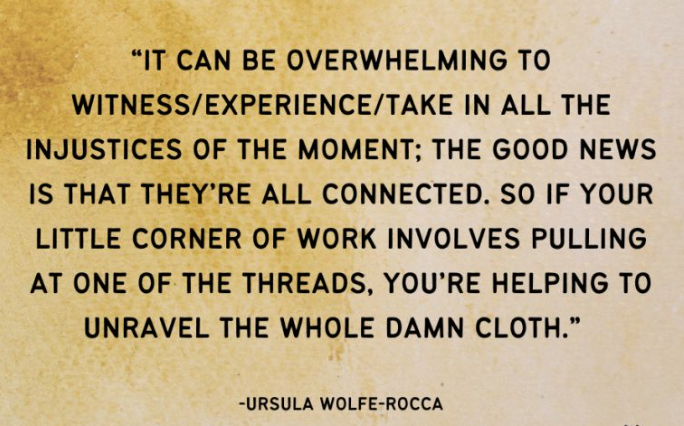The Blog
Notes from our team
A Letter for Heavy Times
Where our stories begin, what we’re carrying right now, and our work to build a different America
A Season of Change: My Own Journey of Choosing Sustainability in a Culture of Constant Production
After two years as a Health Coach with Head & Heart, JodiAnn shares a powerful reflection on stepping away to honor sustainability, challenge hustle culture, and resist the systems that devalue rest and embodiment.
The Complicated Liberation of Leaving Diet Culture
There’s a deep kind of relief that comes with leaving diet culture—but also real grief. This blog explores what it means to stop fighting your body in a world that still tells you to shrink. It’s about the courage it takes to choose yourself, even when the world makes that hard. Because the path to freedom isn’t easy—but it’s the only one that lets you stay whole.
Your Body Is Not The Problem: Finding Peace When The World Is On Fire
In a world that feels increasingly hostile, where each news cycle brings fresh anxiety, many of us are struggling with the basics of self-care. And you know what? That makes perfect sense. It's easy to believe your body is the problem—but it's not. The real issue is a culture that profits from your exhaustion and self-doubt. Finding peace means rejecting these pressures and embracing your body's worth, just as it is.
Talkin' 'Bout a New Year's Revolution
This New Year, we’re rejecting the pressure to shrink ourselves and instead focusing on building strength, solidarity, and self-acceptance. Every moment spent chasing impossible standards is energy stolen from creating the world we want to see.
Join a movement that prioritizes resilience over restriction, joy over shame, and collective power over isolation. This year, resolve to take up space, embrace your body as it is, and channel your energy into meaningful change.
The revolution needs you, exactly as you are.
Healing Spaces: The Transformative Power of Therapeutic Design
Our environment isn't just a backdrop, it's a powerful force shaping our mental and emotional well-being.
Why We’re Ditching the “New Year, New You” Mantra in 2024
A new year often brings about a wave of resolutions centered around weight loss. Body hatred has become a normalized New Year routine. What if instead of fixating on weight-centered goals, this year you that embraced a weight-neutral approach to health and wellness to honor your innate desire for change as well as the excitement of renewal? This is your invitation.
Northern Express Feature: From Community Solutions To Systemic Challenges
Ashlee Cowles from the Northern Express interviews two therapists and explores the need for mental health support in the post-pandemic landscape and advice for those looking for care.
Are You Serving Shame at Your Family’s Dinner Table?
The dinner table can be a healthy, happy place for families to build relationships and communication skills but if shame around body, food choices, hunger or fullness is the main course, the negatives of that experience are outweighing the positives. To get the shame off the table, it is our job as parents to deeply examine and revise our own relationships with our bodies and nourishment
Kids and Weight: This one shift in our thinking could radically improve health for future generations
We, as parents, need to stop conflating health with thinness if we want to set our children up for the best possible health outcomes. The best chance our children have for a healthy future is for us to confront our own body shame and need for weight neutrality: the shift to weight neutrality is essential for the well-being of our children — and their children. Future generations — and their health — are worth it.
Weight-Neutrality IS Healthy
Weight neutrality de-centers bodyweight as the primary marker of health. Weight centrism is not evidence-based. Weight centrism is pro-thinness and anti-health. Weight neutrality offers a path out of the dysfunction and damage caused by weight centrism to heal our relationships with body, food and movement. Weight neutrality is pro-health.
You deserve freedom from body shame.
You deserve the healthy behaviors that you long for.
And your body deserves respect, dignity and compassionate care.
What to do about your pandemic weight gain
What if: you deserved more than a life of restriction, hunger, and trying to shrink yourself? It’s not an easy path, but body liberation and peace await.












